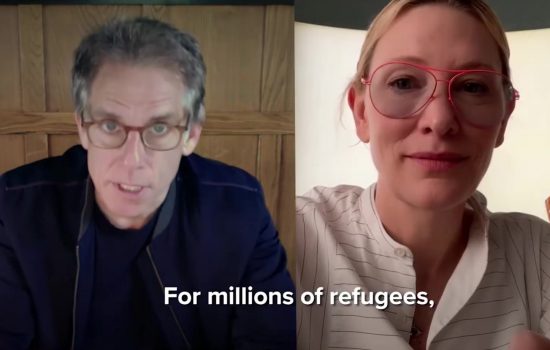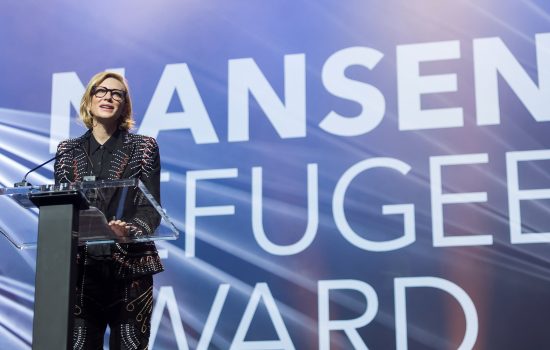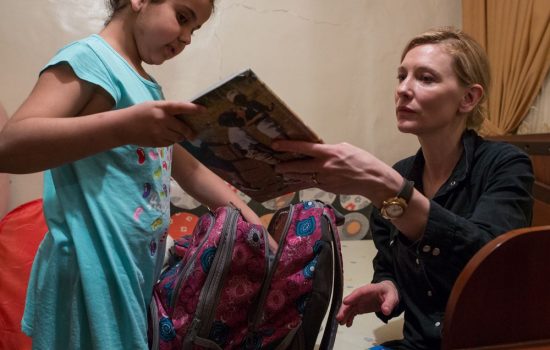Hi, everyone!
Stateless has won 6 AACTA Industry Awards so far then the acting/best teleseries category which Cate is nominated for supporting actress and as a producer will be announced on November 30th then broadcasted on Foxtel – Arts on Sunday December 6th at 7:30pm. Meanwhile, read this new article on Cate.
While Cate Blanchett is living in Britain – locked down amid a shocking surge in COVID-19 cases – one of Australia’s greatest actors remains acutely conscious of her home country’s poor record of detaining refugees over the years.
“There is so much to be proud of in Australia but our treatment of refugees and asylum seekers is not our finest hour,” she says. “Not by a long chalk.”
It was a shared concern about troubling events at detention centres over breakfast with a former MLC schoolfriend, director Elise McCredie, that led to them creating the television series Stateless with producer Tony Ayres.
After a world premiere at the Berlin Film Festival, then screening on the ABC and Netflix around the world, the series has a dominant 18 nominations at this year’s Australian Academy of Cinema and Television Arts Awards. At Friday night’s Industry Awards, it won six craft prizes with more expected at the main ceremony on Monday.
Blanchett, who is nominated for both producing and acting in Stateless, calls the success of the series “beyond gratifying”.
“Obviously, the series takes place in Australia but the predicaments and themes it touches on are universal,” she said. “We live in a world where every two seconds somebody is forced to leave their home. This is a story that allows us to ask the question: ‘What would I do in that situation?'”
While the pandemic has drawn attention away from the global refugee crisis, Blanchett believes it remains a pressing issue.
“On one level, the pandemic has meant that people have been understandably focused on their local health and safety,” she said. “But people have also been forced to look at how interconnected the world’s challenges are and how vital it is that we all play a part in seeking solutions.
“We have been living with massive uncertainty, and uncertainty is an ongoing condition for refugees and asylum seekers and indefinite detention is a traumatic and deeply inhumane extension of this.”
McCredie said their breakfast took place at Blanchett’s Sydney home amid controversy around the Manus Island and Nauru detention centres in 2014.
“We just started talking about what we were passionate about and [it was] immigration detention,” she said. “That was the height of Manus and Nauru and the beginning of offshore detention. We started throwing around ideas about moral responsibility and how we felt about our government.”
They decided to tell a fictional story set in the past, inspired by the wrongful confinement of Cornelia Rau. McCredie said indefinite detention was still continuing away from public attention.
“People who were on Manus for six years are now in hotels in Melbourne and have been for a year,” she said. “As a country, humanity has to be part of the policy and it hasn’t been really for 20 years.”
Blanchett said it took time to find series partners willing to “look beyond the politicisation of the refugee and asylum-seeker experience, to look beyond the rhetoric of fear and xenophobia to the human face of the global displacement crisis”.
What drove them was a passion to bring “this painful, bewildering and on-going situation into the light – to look at this diabolical and dysfunctional situation from a myriad of perspectives, without judgment, allow people to discuss it, examine it and connect to it”.
What was it like producing the series while acting in it?
“An absolute joy,” Blanchett said. “Everyone, from the background artists to the chippies to the actors, was so passionate about the project.”
Source: Sydney Morning Herald





 A Manual for Cleaning Women (202?)
A Manual for Cleaning Women (202?) Father Mother Brother Sister (2025)
Father Mother Brother Sister (2025)  Black Bag (2025)
Black Bag (2025)  The Seagull (2025)
The Seagull (2025) Bozo Over Roses (2025)
Bozo Over Roses (2025) Disclaimer (2024)
Disclaimer (2024)  Rumours (2024)
Rumours (2024)  Borderlands (2024)
Borderlands (2024)  The New Boy (2023)
The New Boy (2023) 











